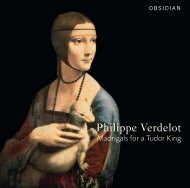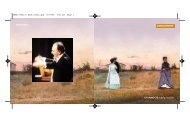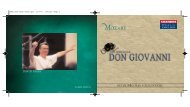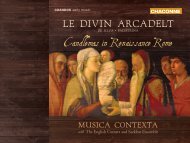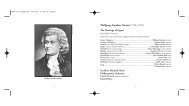You also want an ePaper? Increase the reach of your titles
YUMPU automatically turns print PDFs into web optimized ePapers that Google loves.
<strong>Laudibus</strong><br />
<strong>Mike</strong> <strong>Brewer</strong><br />
songs
Song of Songs<br />
<strong>Laudibus</strong><br />
<strong>Mike</strong> <strong>Brewer</strong> conductor<br />
1 Set me as a seal upon thine heart [3.32]<br />
William Walton (1902–1983)<br />
2 Surge, amica mea [2.00]<br />
Guillaume Bouzignac (1592–1641)<br />
Rise up, my love*<br />
Howard Skempton (b. 1947)<br />
3 Rise up, my love [4.24]<br />
4 How fair is thy love [2.13]<br />
5 My beloved is gone down [1.22]<br />
6 How fair and how pleasant [2.39]<br />
7 I am the Rose of Sharon* [6.13]<br />
Gabriel Jackson (b. 1962)<br />
8 Dilectus meus mihi [7.20]<br />
Francis Grier (b. 1955)<br />
9 Quam pulcra es [1.49]<br />
John Dunstaple (c. 1390-1453)<br />
Recorded on 14 & 15 January<br />
2006 in St Silas the Martyr,<br />
Kentish Town, London.<br />
Producer: Paul Baxter<br />
Engineer: Adam Binks<br />
24-Bit digital editing:<br />
Thomas Hewitt Jones<br />
24-Bit digital mastering:<br />
Paul Baxter and<br />
Thomas Hewitt Jones<br />
10 Descendi in hortum meum [2.42]<br />
Giovanni Pierluigi da Palestrina (1525-1594)<br />
11 Vadem et circuibo civitatem [9.58]<br />
Tomás Luis de Victoria (1548-1611)<br />
Le cantique des cantiques<br />
Jean Yves Daniel-Lesur (1908-2002)<br />
12 Dialogue [3.11]<br />
13 La Voix du Bien-aimé [4.07]<br />
14 Le Songe [1.50]<br />
15 Le Roi Salomon [1.26]<br />
16 Le Jardin clos [4.29]<br />
17 La Sulamite [3.18]<br />
18 Epithalame [3.14]<br />
Total playing time: [65.50]<br />
* world premiere recordings<br />
Design: Drew Padrutt<br />
Photography © Delphian<br />
Records Ltd<br />
Photography editing:<br />
Dr Raymond Parks<br />
Cover image:<br />
With thanks to Fr Graeme<br />
Rowlands and Gabriel Jackson.<br />
Song of Songs<br />
While the Song of Songs, or The Song of<br />
Solomon, is firmly established as a constituent<br />
book of the Jewish Bible and of the Christian<br />
Old Testament, it stands apart from its<br />
surroundings as one of the supreme love<br />
poems of world literature. Many attempts have<br />
been made over the centuries to interpret it<br />
as an allegory of the soul’s relationship with<br />
God, or Christ, and in the Roman Catholic<br />
tradition its descriptions of female beauty have<br />
been co-opted into the veneration of the Virgin<br />
Mary. But there seems no convincing reason<br />
not to take it at face value, as a celebration of<br />
erotic love in the form of a dialogue between<br />
a bridegroom, presumably King Solomon, and<br />
his bride, perhaps a Pharaoh’s daughter, with<br />
a ‘chorus’ of the bride’s companions. (The<br />
New English Bible, following two manuscript<br />
sources, indicates these characters throughout<br />
the text). The poem is remarkable for the<br />
way in which it invokes all the senses, and<br />
in particular smell: the fragrance of wine,<br />
blossom, fruits and spices hangs over it from<br />
first to last. But the sense of sound is restricted<br />
to a fleeting mention of birdsong; even ‘the<br />
voice of my beloved’ is not described. So it is<br />
hardly surprising that many composers over<br />
the centuries have added the dimension of<br />
music to the text. This disc contains settings<br />
of parts of the Song of Songs, in Latin, French<br />
and the English of the King James Bible, all for<br />
unaccompanied voices, and spanning some five<br />
and a half centuries.<br />
The earliest setting is by John Dunstaple – the<br />
first great English composer, or at least the first<br />
who can be clearly identified from surviving<br />
works and references. An astronomer and<br />
mathematician as well as a musician in various<br />
royal and ducal households, he was praised on<br />
the European mainland as one of the instigators<br />
of the influential ‘contenance Angloise’ or<br />
‘English attitude’ – a term apparently indicating<br />
fullness and sweetness of harmony. This<br />
sweetness is especially appropriate to the<br />
sensual text of Quam pulcra est, a processional<br />
antiphon to the Blessed Virgin Mary written<br />
some time before about 1430. The texture<br />
of three parts moving together, with only<br />
momentary divergences from parallel harmony,<br />
both puts the emphasis on the harmonic aspect<br />
of the work and ensures that the words are<br />
clearly heard.<br />
In the humanistic climate of the Renaissance,<br />
the Song of Songs was highly valued as an<br />
expression of personal emotion, and many<br />
composers chose to make settings of parts<br />
of it. Foremost among them was Giovanni<br />
Pierluigi da Palestrina, the leading figure<br />
in church music in Rome in the second<br />
half of the sixteenth century, whose large<br />
output of masses and motets has always<br />
been considered the acme of Renaissance<br />
polyphony. His fourth book of motets, published<br />
in 1584, is subtitled ‘ex Canticis canticorum’,<br />
and consists of a cycle of twenty-nine five-part
Song of Songs<br />
settings of texts from the Song of Songs. In<br />
the dedication of the volume to Pope Gregory<br />
XXIII, Palestrina described it as making amends<br />
for his earlier publication of madrigals on<br />
poems of profane love; but at the same time<br />
he explained that its subject, ‘the divine love of<br />
Christ and his spouse the soul’, had demanded<br />
of him ‘a kind of music somewhat livelier than I<br />
have been accustomed to use in ecclesiastical<br />
melodies’. And indeed his approach to the texts<br />
is essentially that of the secular madrigal. For<br />
example, in No. 24 of the collection, Descendi<br />
in hortum meum, ‘I went down into my garden’<br />
is set to a string of descending scales in all the<br />
parts in turn, and ‘whether the vine flourished’<br />
to a luxuriantly extended figure gradually<br />
spreading through the whole texture.<br />
There is some madrigalian text-painting: the<br />
bride searches for her beloved through the<br />
city streets in an increasingly dense maze of<br />
ascending and descending scale figures; ‘that<br />
I am sick of love’ extends itself in downwardcurling<br />
phrases to end the first part; and<br />
there are suitable downward scales for ‘quo<br />
declinavit’ (the equivalent of ‘whither …<br />
turned aside’ in the English Bible), and upward<br />
phrases for the beloved climbing into the palm<br />
tree. But the work sustains interest chiefly<br />
through its variety of textures, with the upper<br />
voices sometimes pitted against the lower, as<br />
at the start, but with many other contrasting<br />
groupings, and with some magnificently<br />
resonant passages for the full choir.<br />
A later and lesser-known figure among<br />
The greatest Spanish contemporary of Renaissance church composers is Guillaume<br />
Palestrina was Tomás Luis de Victoria. He was Bouzignac, whose career can be traced to<br />
trained in Rome, thus coming under Palestrina’s church and cathedral posts in various French<br />
influence, and he remained in the city, holding cities – probably including Tours, where a<br />
various appointments as both musician and manuscript in the municipal library preserves<br />
priest, until recalled to the service of the most of the surviving works attributed to him.<br />
Spanish royal family in 1585. His surviving Those works include many motets designated<br />
output consists entirely of church music; in the most recent New Grove Dictionary as<br />
among the many motets are several settings ‘paraliturgical’ – that is, based on non-liturgical<br />
of texts from the Song of Songs. Vadam et (and sometimes non-Biblical) texts, and<br />
circuibo civitatem first appeared in Victoria’s imported into a service as a kind of preaching<br />
first volume of motets, published in Venice in in music. Surge, amica mea, one of a number<br />
1572, and was reprinted in 1589 in a collection of settings among those motets of texts from<br />
published in Rome. It is a large-scale work for the Song of Songs, is for six voices, possibly<br />
six voices and in two distinct sections, on a text with the support of an organ continuo (though<br />
compiled from several chapters of the book. if so the part is now lost). It sets off a single<br />
part, alternately first soprano and first tenor,<br />
against the other five moving in harmony,<br />
before ending in more unified four- and sixpart<br />
textures.<br />
The sensuality of the Songs of Songs is allied to<br />
the sensuality of a significant strand of French<br />
music and to that of the French language –<br />
though ultimately to a devotional purpose–<br />
in the remarkable Le Cantique des cantiques<br />
by Daniel-Lesur. Like many other French<br />
composers of the twentieth century, Daniel-<br />
Lesur (the single professional name adopted<br />
by Daniel Jean Yves Lesur) can most readily be<br />
‘placed’ through an affiliation: in 1936, he was a<br />
co-founder with Olivier Messiaen, André Jolivet<br />
and Yves Baudrier of the Jeune France group,<br />
which asserted human as opposed to abstract<br />
values in composition. In his youth a pupil of<br />
Charles Tournemire, he taught for many years at<br />
the Schola Cantorum, the institution upholding<br />
the tradition of French religious music; he<br />
also worked for French radio and held several<br />
influential government posts. Daniel-Lesur<br />
composed Le Cantique des cantiques in 1952<br />
in response to a commission from French radio.<br />
It is a setting in seven movements of excerpts<br />
chosen from throughout the Song of Songs:<br />
these excerpts are arranged (with one small<br />
exception) in their original sequence; even the<br />
refrain ‘Daughters of Jerusalem’, which ends<br />
the first, third and sixth movements, is used<br />
where it occurs as a refrain in the Biblical text.<br />
The work is dedicated ‘to Marcel Couraud and<br />
his Vocal Ensemble’, and it is laid out for the<br />
twelve solo voices of that pioneering group<br />
(which had also premiered another, very<br />
different celebration of love, Messiaen’s Cinq<br />
rechants). ‘Tutti’ and ‘solo’ markings allow the<br />
work to be performed by larger choirs. But in<br />
either configuration the twelve-part scoring<br />
ensures richness of harmony and detail, and<br />
a remarkable variety of vocal ‘orchestration’.<br />
In particular, from the opening quintupletime<br />
‘Dialogue’, male and female voices<br />
are frequently used to suggest the identity<br />
of the speaker, bride or bridegroom. When<br />
this happens, the other voices often add an<br />
additional element, as if evoking the fragrances<br />
in the air of the original poem. This extra<br />
element may be wordless singing or humming,<br />
or the percussive syllables which accompany<br />
the dance of ‘The Shulamite’, or exclamations<br />
of Christian and Jewish worship: ‘Alleluia’,<br />
‘Shéma’. But in two movements it aligns the<br />
work more closely with the Christian allegorical<br />
interpretation of the Song of Songs. In ‘The<br />
Dream’, the bride’s description of her search<br />
for her beloved is accompanied not only by<br />
cries of ‘Yahvé’, or ‘Jahweh’, the Hebrew name<br />
of God, but also by fragments of Christian<br />
prayer in Latin. And in the final ‘Epithalamium’<br />
or wedding hymn, the setting of the text<br />
beginning ‘Set me as a seal upon thine heart’<br />
is counterpointed by a setting in the manner<br />
of a mediaeval carol of the Latin antiphon Veni<br />
sponsa Christi, ‘Come, bride of Christ’, which<br />
gathers in all the voices for its final ‘Alleluia’.
Song of Songs<br />
The Song of Songs has attracted many British<br />
composers in the centuries since Dunstaple,<br />
and in particular in the twentieth century. The<br />
most comprehensive treatment is Granville<br />
Bantock’s setting of the entire text as a fulllength<br />
dramatic cantata; the most allusive<br />
Vaughan Williams’s Flos Campi, for viola, chorus<br />
and orchestra, in which the chorus is wordless<br />
and the Biblical references are to be found<br />
in the title and movement headings. Of the<br />
smaller works recorded here, the earliest is by<br />
William Walton, who began his musical career<br />
as a choirboy at Christ Church, Oxford, and in<br />
adult life wrote not only large-scale works for<br />
choir but also some exquisite miniatures. His<br />
wedding anthem Set me as a seal upon thine<br />
heart was written for the marriage of Ivor Guest<br />
(the son of Walton’s lover Alice, Lady Wimborne)<br />
and Mabel Fox-Strangways at the church of St<br />
Mary Abbott in Kensington in November 1938.<br />
It uses a shortened version of the same text<br />
that Daniel-Lesur set in the ‘Epithalamium’ of<br />
his Cantique des cantiques, in the English of<br />
the King James Bible. Solo phrases for tenor<br />
and soprano punctuate passages which apply<br />
Walton’s characteristically tangy harmonies to<br />
the medium of four-part choir.<br />
Among contemporary British composers,<br />
Howard Skempton stands out for the<br />
unforced, carefully considered simplicity of<br />
his writing, mostly in numerous short pieces<br />
for piano and for his own instrument, the<br />
accordion. Rise up, my love, the second of<br />
two settings he has made of English texts<br />
from the Songs of Songs, was composed in<br />
July 2002 in response to a commission from<br />
the Estonian Philharmonic Chamber Choir,<br />
and first performed by the choir under its<br />
conductor Paul Hillier in Tallinn in September<br />
2002. Its four short movements set four<br />
notably sensuous passages from the poem, all<br />
in changing metres responsive to the stresses<br />
of the texts: the first for mixed voices with<br />
flowing harmonic movement, the second for<br />
basses in their low register below a single<br />
sustained note in the tenors, the third for<br />
sopranos and altos in four-part close harmony,<br />
and the last again for mixed voices in slowmoving<br />
chords.<br />
An increasingly prominent figure in the younger<br />
generation of British composers, Gabriel<br />
Jackson was born in Bermuda, and sang as<br />
a chorister at Canterbury Cathedral before<br />
studying with John Lambert at the Royal<br />
College of Music in London. His extensive<br />
list of commissions in Britain and abroad<br />
includes several for vocal groups and choirs.<br />
Jackson composed I am the Rose of Sharon<br />
in May and June 2001 for the male-voice<br />
quintet Opus Anglicanum, which gave the first<br />
performance in Wells Cathedral that July; he<br />
also made a transposed version for five-part<br />
mixed voices, with two alto lines. The luxuriant<br />
nature of the text, and the original scoring for<br />
soloists, encourages the inclusion of floridly<br />
ornamented single lines, standing out against a<br />
slow-moving major-key background, but twice<br />
giving way to a simple chordal refrain.<br />
Somewhat more outside the musical<br />
mainstream is Francis Grier, who broke off<br />
a career as an Oxford organist and lecturer to<br />
study music, theology, and meditation in India,<br />
and since returning to England has divided his<br />
time between composition and psychodynamic<br />
counselling. He describes Dilectus meus mihi,<br />
which he wrote to be performed at the 1987<br />
Edington Festival of Music within the Liturgy,<br />
as a response to the ‘lyrical simplicity and<br />
ecstatic rapture’ of the text. Its deployment<br />
of solo voices, semi-chorus and full eight-part<br />
choir in ever-changing textures, ranging in<br />
density from unsupported single lines to rich<br />
harmonies, recalls the vocal ‘orchestration’ of<br />
Daniel-Lesur’s Cantique des cantiques. And<br />
Grier’s choice of Latin for the text aligns his<br />
work with the centuries-old, and apparently<br />
inexhaustible, tradition of musical enhancement<br />
of the riches of the Song of Songs.<br />
© 2007 Anthony Burton<br />
Anthony Burton spent fifteen years on the production<br />
staff of BBC Radio 3, before leaving in 1989 to<br />
become a freelance writer and broadcaster on a wide<br />
range of music.
Texts and translations<br />
1 Set me as a seal upon thine heart<br />
3 Rise up, my love<br />
4 How fair is thy love<br />
7 I am the Rose of Sharon<br />
William Walton (1902-1983)<br />
Howard Skempton (b. 1947)<br />
Gabriel Jackson (b. 1962)<br />
Set me as a seal upon thine heart,<br />
As a seal upon thine arm:<br />
For love is strong as death.<br />
Many waters cannot quench love,<br />
Neither can the floods drown it.<br />
Chapter 8, vv. 6 & 7<br />
2 Surge, amica mea<br />
Guillaume Bouzignac (b. before 1592; d. after 1641)<br />
Surge, amica mea, columba mea, formosa mea.<br />
Vox dilecti mei.<br />
En dilectus meus, loquitur mihi.<br />
Arise, my love, my beautiful one, my perfect one.<br />
The voice of my beloved.<br />
Behold my beloved speaks to me.<br />
Chapter 8, vv. 8 & 11<br />
Rise up, my love, my fair one, and come away.<br />
For lo, the winter is past,<br />
The rain is over and gone;<br />
The flowers appear on the earth;<br />
The time of the singing of birds is come,<br />
And the voice of the turtle is heard in our land;<br />
The fig-tree putteth forth her green figs;<br />
And the vines with the tender grapes give a<br />
good smell.<br />
Arise, my love, my fair one, and come away.<br />
O my dove, that art in the clefts of the rock,<br />
In the secret places of the stairs,<br />
Let me see thy countenance,<br />
Let me hear thy voice;<br />
For sweet is thy voice,<br />
And they countenance is comely.<br />
Rise up, my love, my fair one.<br />
Chapter 2, vv. 10–14<br />
How fair is thy love, my sister, my spouse,<br />
How much better is thy love than wine!<br />
And the smell of thine ointments than all<br />
spices!<br />
Chapter 4, v. 10<br />
5 My beloved is gone down<br />
My beloved is gone down into his garden, to<br />
the beds of spices,<br />
To feed in the gardens, and to gather lilies.<br />
I am my beloved’s, and my beloved is mine:<br />
He feedeth among the lilies.<br />
Chapter 6, vv. 2–3<br />
6 How fair and how pleasant<br />
How fair and how pleasant art thou,<br />
O love, for delights!<br />
I am my beloved’s,<br />
And his desire is toward me.<br />
Chapter 7, vv. 6 & 10<br />
I am the rose of Sharon,<br />
and the lily of the valley.<br />
As the lily among thorns,<br />
so is my love among the daughters.<br />
As the apple tree among the trees of the<br />
wood,<br />
so is my beloved among the sons.<br />
I sat down under his shadow with great<br />
delight,<br />
and his fruit was sweet to my taste.<br />
I am my beloved’s, and my beloved is mine:<br />
he feedeth among the lilies.<br />
I am come into my garden,<br />
my sister, my spouse:<br />
I have gathered my myrrh with spice;<br />
I have eaten my honeycomb with my honey;<br />
I have drunk my wine with my milk:<br />
eat, O friends; drink, yea drink abundantly, O<br />
beloved.<br />
I am my beloved’s, and my beloved is mine:<br />
he feedeth among the lilies.<br />
He brought me to the banqueting house,<br />
and his banner over me is love.<br />
Chapter 2, vv. 1-3; Ch. 6, v. 3; Ch. 5, v. 1; Ch. 2, v. 4
Texts and translations<br />
8 Dilectus meus mihi<br />
Francis Grier (b. 1955)<br />
10 Descendi in hortum meum<br />
Giovanni Pierluigi da Palestrina (1525-1594)<br />
Dilectus Meus mihi, et ego illi:<br />
Ego dilecto meo, et dilectus meus mihi.<br />
Ego dormio, et cor meum vigilat.<br />
Vox dilecti mei pulsantis:<br />
Aperi mihi, soror mea,<br />
Amica mea, columba mea,<br />
immaculate mea.<br />
Ad juro vos, filiae Jerusalem,<br />
Si inveneritis dilectum meum,<br />
Ut annuntietis ei quia amore langueo.<br />
Talis est dilectus meus,<br />
Et ipse est amicus me filiae Jerusalem.<br />
Chapter 6, v. 2; Ch. 5, v.2; Ch 5, v. 8–16<br />
9 Quam pulcra es<br />
John Dunstaple (c. 1390-1453)<br />
Quam pulcra es et quam decora,<br />
Carissima in deliciis.<br />
Statura tua assimilate est palme,<br />
Et ubera tua botris.<br />
Caput tuum ut Carmelus,<br />
Collum tuum turris eburnea.<br />
Veni, dilecte mi,<br />
egrediamur in agrum,<br />
Et videamus si flores fructus parturierunt,<br />
Si floruerunt mala Punica.<br />
Ibi dabo tibi ubera mea.<br />
Alleluia.<br />
Chapter 7, vv. 4-7 & 12<br />
My beloved is mine, and I am his:<br />
I to my beloved, and my beloved to me.<br />
I sleep, and my heart watches: the voice of my<br />
beloved knocking:<br />
Open to me, my sister,<br />
my love, my dove, my undefiled.<br />
I charge you, O daughters of Jerusalem,<br />
if you find my beloved, to tell him that I am<br />
weak with love.<br />
Such is my beloved, and he is my friend, O<br />
daughters of Jerusalem.<br />
How fair and pleasant you are,<br />
O loved one in delights.<br />
You are stately as a palm tree,<br />
And your breasts are like its clusters.<br />
Your head crowns you like Carmel:<br />
your neck is like an ivory tower.<br />
Come, my beloved,<br />
let us go forth into the fields,<br />
and see whether the grape blossoms have<br />
opened<br />
and the pomegranates are in bloom<br />
There I will give you my love.<br />
Alleluia.<br />
Descendi in hortum meum,<br />
Ut viderem poma convallium,<br />
Et inspicerem si floruisset vinea,<br />
Et germinassentmala punica.<br />
Chapter 6, v. 10<br />
11 Vadem et circuibo civitatem<br />
Tomás Luis de Victoria (1548-1611)<br />
Vadam et circuibo civitatem per vicos et plateas.<br />
Quaeram quem diligit anima mea:<br />
Quaesivi illum, et non inveni.<br />
Adiuro vos filiae Hierusalem,<br />
Si inveneritis dilectum meum,<br />
Ut annuntietis ei quia amore langueo.<br />
Qualis est dilectus tuus quia sic adiurasti nos?<br />
Dilectus meus candidus et rubicundus,<br />
Electus ex milibus: talis est dilectus meus,<br />
Et est amicus meus, Filiae Hierusalem.<br />
Quo abiit dilectus tuus,<br />
O pulcherima mulierium?<br />
Quo declinavit et quaeremus eum tecum?<br />
Ascendit in palmam, et apprehendit fructus eius.<br />
Chapter 3, v. 2; Ch. 5, vv. 8-10 & 16-17; Ch. 7, v. 8<br />
I went down into my garden<br />
to see the fruits of the valley,<br />
and to see if the vineyard had flourished<br />
and the pomegranate budded.<br />
I will rise and go about the city:<br />
in the alleys and in the broad streets<br />
I will seek him whom my soul loves;<br />
I sought him, but I found him not.<br />
I charge you, O daughters of Jerusalem,<br />
if you find my beloved, to tell him that I am<br />
weak with love.<br />
What is your beloved, that you so charge us?<br />
My beloved is white and ruddy,<br />
the choicest among thousands.<br />
Such is my beloved, and such is my love,<br />
O daughters of Jerusalem.<br />
Where has your beloved gone, O loveliest of<br />
women? Where has he turned to?<br />
And we shall seek him with you.<br />
He has climbed into the palm tree, and taken<br />
its fruit.
Texts and translations<br />
Le cantique des cantiques<br />
Jean Yves Daniel-Lesur (1908-2002)<br />
12 Dialogue<br />
Alleluia, alleluia.<br />
A ma cavale attelée au char de Pharaon,<br />
je te compare, Alleluia,<br />
Mon Bien aimé est à moi comme un bouquet<br />
de myrrhe qui repose entre mes seins.<br />
Alleluia<br />
Que tu es belle ma bien aimée, que tu es belle.<br />
Tes yeux sont des colombes.<br />
Que tu es beau mon Bien aimé,<br />
que tu es beau.<br />
Comme le lis entre les chardons,<br />
telle est ma bien aimée entre les jeunes filles.<br />
Comme le pommier parmi les arbres du verger,<br />
tel est mon Bien aimé parmi les jeunes homes.<br />
J’ai desire son ombrage et m’y suis<br />
assise et son fruit est doux à ma bouche.<br />
Il m’a menée au cellier du vin<br />
et la bannière qu’il dresse sur moi c’est l’amour.<br />
Filles de Jérusalem! N’eveillez pas la bien<br />
aimée avant l’heure de son bon plaisir.<br />
Alleluia, alleluia.<br />
I would compare you, my dearest,<br />
to a chariot-horse of Pharaoh, Alleluia.<br />
My beloved is for me a sachet of<br />
myrrh lying between my breasts.<br />
Alleluia<br />
How beautiful you are, my dearest, how<br />
beautiful, your eyes are like doves!<br />
How beautiful you are, my love,<br />
and how handsome!<br />
A lily among thorns<br />
is my dearest among the maidens.<br />
Like an apple tree among the trees of the<br />
forest, so is my beloved among young men<br />
To sit in his shadow is my delight,<br />
and his fruit is sweet to my taste.<br />
He has taken me into the wine-garden<br />
and given me loving glances.<br />
I charge you, maidens of Jerusalem,<br />
do not rouse or awaken until love is ready.<br />
13 La Voix du Bien-aimé<br />
Shéma shéma shéma<br />
J’entends mon Bien aimé: voici qu’il arrive<br />
sautant sur les manatganes,<br />
bondissant sur les collines.<br />
Mon Bien aimé est semblable à une gazelle,<br />
a un jeune faon.<br />
Mon Bien aimé élève la voix:<br />
Il me dit – Lève toi la mienne amie.<br />
Hâte toi ma colombe et viens<br />
car déjà l’hiver est passé.<br />
La pluie s’en est allée et retirée.<br />
Sur notre terre les fleurs sont apparues;<br />
La voix de la tourterelle est ouie en notre terre;<br />
la voix de la tourterelle s’est fait entendre.<br />
Le figuier a produit ses figues.<br />
Les vignes floissantes exhalent leur parfum.<br />
Montre moi ton visage ma colombe cache<br />
que ta voix sonne en mes oreilles<br />
Car douce est ta voix et beau ton visage.<br />
Mon Bien aimé est à moi, et moi à lui,<br />
il pait son troupeau parmi les lis.<br />
Avant que poigne le jour et que s’abaiassent<br />
les ombres Reviens!<br />
Sois semblable mon Bien aimé a une gazelle<br />
au jeune faon sur les montagnes de l’alliance.<br />
Chapter 2, vv. 10–17<br />
Shéma shéma shéma<br />
Hark! My beloved! Here he comes,<br />
bounding over the mountains,<br />
leaping over the hills.<br />
My beloved is like a gazelle<br />
or a young stag.<br />
My beloved spoke, saying to me:<br />
‘Rise up, my darling;<br />
my fair one, come away.<br />
For see, the winter is past!<br />
The rains are over and gone;<br />
the flowers appear in the countryside;<br />
the turtle-dove’s cooing is heard in our land;<br />
the green figs ripen on the fig trees<br />
and the vine blossoms give forth their<br />
fragrance.<br />
My dove, that hides in holes in the cliffs<br />
let me see your face and hear your voice;<br />
for your voice is sweet, your face is lovely.<br />
My beloved is mine and I am his;<br />
he grazes his flock among the lilies.<br />
While the day is cool and the shadows are<br />
dispersing, turn, my beloved, and show<br />
yourself a gazelle or a young stag on the hills<br />
where aromatic spices grow.<br />
Ch. 1, vv. 9 & 13; Ch. v. 1; Ch. 2, vv. 2 & 3; Ch. 4, v. 16; Ch. 5, v. 8
Texts and translations<br />
14 Le Songe<br />
15 Le Roi Solomon<br />
Misesere mei<br />
Dona nobis pacem<br />
Da pacem Domine<br />
Miserere mei Deus<br />
Deus Meus<br />
Angeli Domini<br />
Domine Deus Agnus Dei<br />
Spera in Deo Domine<br />
Miserere Deus Meus<br />
Libera nos a malo<br />
Exaudi nos Domine<br />
Dona nobis pacem<br />
Yahvé!<br />
Sur ma couche la nuit j’ai cherché celui que<br />
mon cœur aime.<br />
Je l’ai cherché mais ne l’ai pas trouvé.<br />
Je me lèverai donc et parcourai la ville<br />
dans les rues et sur les places,<br />
je chercherai celui que mon cœur aime.<br />
Je l’ai cherché mais ne l’ai pas trouvé.<br />
Les gardes m’ont recontrée<br />
ceux qui font la ronde dans la ville.<br />
Avez-vous vu Celui que mon cœur aime.<br />
Filles de Jerusalem,<br />
N’eveillez pas la bien aimée avant l’heure de<br />
son bon plaisir.<br />
Have mercy upon me.<br />
Grant us peace.<br />
The peace of God.<br />
Have mercy upon me God.<br />
My God,<br />
Guardian Lord,<br />
Lamb of God<br />
Trust in the Lord.<br />
Our Lord have mercy upon us.<br />
Deliver us from evil.<br />
Hear us O Lord.<br />
Grant us peace.<br />
Yahvé!<br />
Night after night on my bed I have sought my<br />
true love;<br />
I have sought him, but I have not found him.<br />
I said ‘I will rise and go the round of the city<br />
through the streets and squares,<br />
seeking my true love.’<br />
I sought him, but could not find him.<br />
The watchmen came upon me, as they made<br />
their rounds of the city,<br />
‘Have you seen my true love’ I asked them<br />
I charge you, maidens of Jerusalem,<br />
do not rouse or awaken love<br />
until it is ready.<br />
Qu’est-ce là qui monte du désert? Comme<br />
une colonne de fumée? vapeur d’aromates<br />
de myrhhe? vapeur d’encens de tous<br />
parfums exotiques?<br />
Soixante homes vaillants guerriers, vétérans<br />
des combats le glaive au côté le plus forts<br />
d’Israël l’envirronment le roi Salomon.<br />
S’est fait un trône en cèdre du Liban, le<br />
dossier d’or, le siege de pourpre.<br />
Venez filles de Sion contempler Salomon<br />
portent le diadème don’t le couronna sa<br />
mère au jour de ses noces de la joie<br />
de son cœur.<br />
Chapter 3, vv. 6–11<br />
Who is this coming up from the wilderness like<br />
a column of smoke from the burning of myrrh<br />
and frankincense?<br />
Look! It is Solomon carried in his state litter,<br />
escorted by sixty of Israel’s picked warriors,<br />
each with his sword ready at his side.<br />
The palanquin which King Solomon had made<br />
for himself was of wood from Lebanon;<br />
its headrest of gold; its seat was of purple.<br />
Come out, maidens of Jerusalem;<br />
you maidens of Zion, welcome King Solomon,<br />
wearing the crown which his mother placed on<br />
his head on his wedding day, his day of joy.<br />
Chapter 3, vv. 1–5
Texts and translations<br />
16 Le Jardin Clos<br />
Que tu es belle ma bien aimé, que tu es belle.<br />
Tex yeux sont des colombes,<br />
tes cheveux comme un troupeau de chèvres<br />
ondulant sur les pentes du Galaad.<br />
Tes dents comme un troupeau de<br />
brebistondues qui remontent du bain;<br />
chacune a sa jumelle.<br />
Tes joues moitiés de grenades à travers ton voile.<br />
Tes deux seins sont comme deux bichelots<br />
gémeaux de la biche qui paissent parmi les lis.<br />
Tu me fais perdre le sens par un seul de tes<br />
regards, ma sœur ma fiancée<br />
Viens du Liban et tu seras couronnée<br />
du chef d’Amana!<br />
Elle est un jardin bien clos ma sœur, ma<br />
fiancée, un jardin bien clos une source scellée.<br />
Que mon Bien aimé entre dans son jardin et<br />
qu’il en goûte les fruits délicieux.<br />
Chapter 4<br />
How beautiful you are, my dearest, how<br />
beautiful! Your eyes are doves behind your veil,<br />
your hair like a flock of goats streaming down<br />
Mount Gilead.<br />
Your teeth are like a flock of ewes newly shorn,<br />
freshly come up from the dipping; all of them<br />
have twins.<br />
Your parted lips behind your veil are like a<br />
pomegranate cut open. Your two breasts are<br />
like two fawns, twin fawns of a gazelle grazing<br />
among the lilies. You have stolen my heart, my<br />
sister, with just one of your eyes.<br />
Come with me from Lebanon. Hurry down<br />
from the summit of Amana.<br />
My sister, my bride, is a garden close-locked, a<br />
fountain sealed.<br />
That my beloved may come to his garden<br />
And enjoy the choice fruit.<br />
17 La Sulamite<br />
Pourquoi regardez vous la Sulamite?<br />
How you love to gaze on the Shulammite,<br />
Dansant comme en un double chœur? As she moves between the lines of dancers!<br />
Que tes pieds sont beaux dans<br />
How beautiful are your sandaled feet, O<br />
tes sandals fille de prince.<br />
Prince’s daughter!<br />
La courbe de tes flancs est<br />
The curves of your thighs are like ornaments<br />
comme une collier.<br />
You carry your head like Carmel;<br />
Ton chef de dresse semblable au Carmel, Your flowing locks are lustrous black.<br />
tes cheveux sont comme la pourpre.<br />
How beautiful, how entrancing you are,<br />
Un roi est pris à ses boucles,<br />
My loved one, daughter of delights!<br />
mon amour mes délices.<br />
You are stately as a palm tree,<br />
Dans son élan tu ressembles au palmier. And your breasts are like clusters of fruit.<br />
Tes seins en sont les grappes.<br />
I said, ‘Let me climb up into the palm to grasp<br />
J’ai dit je monterai un palmier<br />
its fronds’.<br />
j’en saisirai les regimes.<br />
I am my beloved’s, his longing is all for me.<br />
Je suis à mon Bien aimé et son désir tend vers moi. Come, my beloved, let us go out into the fields,<br />
Viens mons Bien aimé sortons<br />
Let us pass through the villages and go early<br />
dans la campagne.<br />
into the vineyards.<br />
Nous passerons la nuit dans les villages, dès There I shall give you my love,<br />
le matin nous irons dans les vignes.<br />
I charge you, maidens of Jerusalem:<br />
Là je te ferai le don de mes amours.<br />
Do not rouse or awaken love until it is ready.<br />
Filles de Jérusalem, n’éveillez pas la bien<br />
aimée avant l’heure de son bon plaisir.<br />
Chapter 7
Texts and translations<br />
18 Epithalame<br />
Veni sponsa Christi accipe coronam.<br />
Quam tibi Dominus praeparavit in aeternum.<br />
Pose moi comme un sceau sur ton cœur,<br />
comme un sceau sur ton bras car l’amour est<br />
fort comme la mort.<br />
La jalousie est dure comme<br />
l’enfer une flame de Yahvé!<br />
L’amour ses traits sont de feu une<br />
flame de Yahvé!<br />
Les grandes eaux n’ont pu éteindre l’amour les<br />
fleuves ne le submergeront pas!<br />
Alleluia!<br />
Chapter 8, vv. 6 & 7<br />
Come, the promise of Christ to accept the<br />
crown that God has created for all eternity.<br />
Set me as a seal upon your heart, as a seal<br />
upon your arm;<br />
for love is strong as death,<br />
passion cruel as the grave.<br />
It blazes up like a blazing fire,<br />
fiercer than any flame.<br />
Many waters cannot quench love,<br />
neither can the floods drown it;<br />
Alleluia!<br />
<strong>Laudibus</strong><br />
Regarded as one of the finest chamber choirs<br />
in the world, <strong>Laudibus</strong> is equally renowned<br />
both for its breadth of programming and its<br />
dynamic concert performances. <strong>Laudibus</strong><br />
appeared with The King’s Singers in their<br />
25th anniversary concert at the Barbican,<br />
and in 1998 won both the sacred and secular<br />
sections for both amateur and professional<br />
vocal ensembles in the prestigious Tolosa<br />
International Choral Competition in Spain.<br />
Festival appearances have included Aldeburgh,<br />
Bath, Harrogate, Hexham and the Huddersfield<br />
Contemporary Music Festival. Noted for its<br />
exceptional performances of uncompromising<br />
contemporary music, <strong>Laudibus</strong> has premiered<br />
works by many leading British composers:<br />
among them Gavin Bryars, Giles Swayne<br />
and Richard Allain. <strong>Laudibus</strong> has been widely<br />
recorded and broadcast. Recent engagements<br />
include a Proms appearance with the National<br />
Youth Orchestra, the National Holocaust<br />
memorial service, and concerts at London’s<br />
Southbank Centre.<br />
<strong>Mike</strong> <strong>Brewer</strong><br />
in Mexico, Venezuala, Peru, the USA, Singapore,<br />
New Zealand, Australia and the Seychelles. He<br />
is Advisor on World Music to the IFCM.<br />
<strong>Mike</strong> is consultant for over 20 prize-winning UK<br />
choirs. He has often served as adjudicator for<br />
the finals of Choir of the Year and the National<br />
Festival of Music for Youth in the UK and in<br />
international competitions.<br />
Since 1983 <strong>Mike</strong> has been Musical Director of<br />
the National Youth Choirs of Great Britain. He<br />
also conducts <strong>Laudibus</strong>, the award-winning<br />
chamber choir of NYC graduates, which, like<br />
NYC, records on the Delphian Label.<br />
<strong>Mike</strong> <strong>Brewer</strong>’s books for Faber Music include<br />
the best selling Kickstart Your Choir, Warmups,<br />
Improve Your Sightsinging (with Paul Harris)<br />
and Finetune Your Choir. Hamba Lulu, his set of<br />
African songs is performed worldwide. Newly<br />
published by Faber are Playpiece, commissioned<br />
for the Aberdeen Festival, Worldsong, performed<br />
in the Schools’ Proms 2005, and a second set of<br />
African Songs, Babevuya.<br />
<strong>Mike</strong> <strong>Brewer</strong> is in demand worldwide for<br />
vocal and conducting workshops and guest<br />
conducting of choirs. In 2006-7 his tours take<br />
<strong>Mike</strong> was a Churchill Fellow for 2002/3.<br />
He was appointed OBE in 1995.
<strong>Laudibus</strong><br />
Sopranos<br />
Faith <strong>Brewer</strong><br />
Felicity Brown<br />
Nicola Corbishley<br />
Anne-Marie Cullum<br />
Joanna Goldsmith<br />
Alison Hill<br />
Quintilla Hughes<br />
Naomi L’Estrange<br />
Katy Leigh<br />
Lisa Swayne<br />
Altos<br />
Kathy Banister<br />
Katie Lee<br />
Martha McLorinan<br />
Beth Mackay<br />
Ruth Nixon<br />
Rachel Shatliff<br />
Kitty Whately<br />
Tenors<br />
David Bond<br />
Robin Firth<br />
Julian Forbes<br />
Christopher Hann<br />
Alexander Jarrett<br />
<strong>Mike</strong> Jeremiah<br />
Thomas Johnson<br />
Edward Lee<br />
Basses<br />
Thomas Appleton<br />
Alexander Hargreaves<br />
Guy Hayward<br />
Christopher Jay<br />
Bartholomew Lawrence<br />
David Le Prevost<br />
Giles Swayne: Convocation<br />
The National Youth Choir of Great Britain; <strong>Laudibus</strong>;<br />
<strong>Mike</strong> <strong>Brewer</strong>, conductor; Michael Bonaventure, organ;<br />
Stephen Wallace, counter-tenor DCD34033<br />
When a powerful team of new music exponents come together, magic<br />
will happen; when the music is by Giles Swayne, a composer whose<br />
light shines brilliantly in its own unique direction, the results will entrance.<br />
This disc offers a bracing sonic experience - vividly communicative music<br />
performed with rare verve, passion, and youthful vibrancy.<br />
‘The performances are magical. The National Youth Choir of Britain and<br />
<strong>Laudibus</strong>, both under the direction of veteran choral conductor <strong>Mike</strong><br />
<strong>Brewer</strong>, exhibit a precision and exuberance that are further enhanced<br />
by a rich, vibrant sound. This is choral singing of the very first rank’ –<br />
International Record Review, February 2007<br />
Sir Peter Maxwell Davies: Sacred Choral Works<br />
The Choir of St Mary’s Cathedral; Matthew Owens, conductor;<br />
Michael Bonaventure, solo organ; Simon Nieminski, organ<br />
accompaniment; RSAMD Ensemble DCD34037<br />
In the 1960s few would have predicted that Sir Peter Maxwell Davies<br />
would eventually write a set of Evening Canticles; yet religious texts<br />
have always been of fundamental importance to the composer as this<br />
disc vividly demonstrates by bringing together sacred masterworks<br />
from both ends of his career.<br />
‘All the music on this disc represents a very important and vivifying<br />
contribution to the Anglican choral repertoire, one that ought to be<br />
long-lasting.’ – Gramophone, Awards edition 2006
DCD34042





